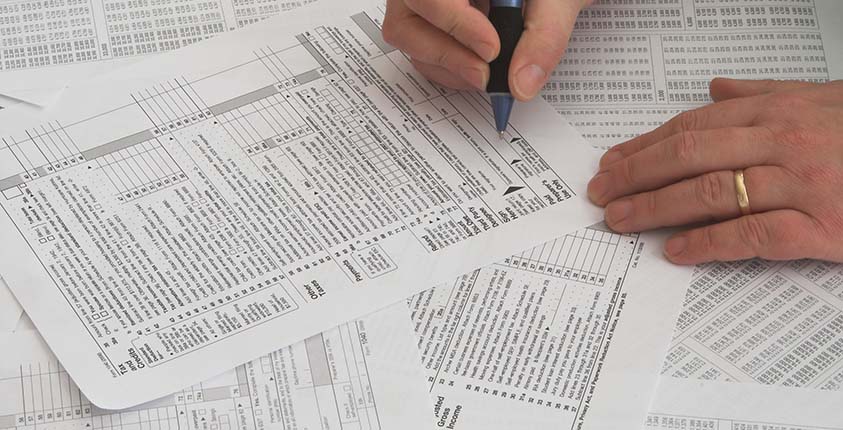Consultant’s Corner: Income Tax by Entity Type

Q: What are the income tax considerations for different business entity types?
To develop a better understanding of the differences in tax treatment and owner distributions/compensation for sole proprietorships, partnerships, C corps, S corps and similarly taxed LLCs, you can review the following basic guidelines:
- Sole proprietorship and LLC taxed as a sole proprietorship. A sole proprietorship is a pass-through entity for tax purposes. In a sole proprietorship, the business net profit or loss flows through to the business owner, who reports the business income and expenses on Schedule C of his or her personal Form 1040. When a sole proprietorship is profitable, the business owner periodically takes cash draws from the business to the extent of the business net profits; however, the business net profit is subject to tax regardless of whether the owner ever takes profit distributions from the business. Net profit from a sole proprietorship is subject to personal federal and state income tax and, if net self-employment earnings are $400 or more, the Self-Employment Tax (SE Tax). Sole proprietors are not required to withhold payroll taxes from their periodic cash draws, which are not deductible as a business expense by the sole proprietorship, but they may need to make personal estimated income tax payments depending on their personal income tax situation. You can review information on the taxation of sole proprietorships at the following websites:
http://www.nolo.com/legal-encyclopedia/how-sole-proprietors-are-taxed-30292.html
http://www.irs.gov/Businesses/Small-Businesses-&-Self-Employed/Sole-Proprietorships
- Partnership and LLC taxed as a partnership. A partnership is also a pass-through entity for tax purposes. The partnership reports all of its income and expense on a separate tax return, Form 1065, and pays no tax on its net profit. A partnership passes through its net profit or loss to the partners based on their ownership interest in the partnership. Each partner’s share of the partnership’s net profit or loss is reported by the partnership on Schedule K-1. Each partner reports the amounts from their respective Schedule K-1 on Schedule E of their personal Form 1040. Partners do not take a W-2 salary but may take guaranteed payments, which the partnership deducts as a business expense, and or periodic cash draws of their share of the partnership’s net profits, which the partnership cannot deduct as a business expense. However, partners are taxed on their entire share of the partnership’s net profit regardless of whether they ever take profit distributions. Partners are not required to withhold payroll taxes from their guaranteed payments or periodic cash draws, but they may need to make personal estimated income tax payments depending on their personal income tax situation. Generally, a partner’s guaranteed payments and share of the partnership’s net profit will be subject to both federal and state personal income tax and, if net self-employment earnings are $400 or more, the SE Tax. You can review IRS and related information on partnerships at the following websites:
http://www.irs.gov/publications/p541/index.html
http://www.nolo.com/legal-encyclopedia/how-partnerships-are-taxed-29710.html
- C corporation and LLC taxed as a C corporation. A C corp pays tax on its net income. The corporation reports all of its income and expense on a separate tax return, Form 1120. In a C corp, business owners who perform services for the corporation are generally required to take a W-2 salary, which is subject to payroll tax withholding and deducted as a business expense by the corporation. The owners generally take distributions of the business after-tax profits in the form of dividend distributions, which are not deducted as a business expense by the corporation. Both W-2 salary and dividend distributions are considered personal taxable income to the business owner. You can review IRS and related information on C corporations at the following websites:
http://www.irs.gov/publications/p542/index.html
http://www.nolo.com/legal-encyclopedia/how-corporations-are-taxed-30157.html
- S corporation and LLC taxed as an S corporation. An S corp is also a pass-through entity for tax purposes. The S corp reports all of its income and expense on a separate tax return, Form 1120S, and pays no tax on its net income. An S corp passes through its net profit or loss to the business owners based on their stock ownership interest in the corporation. Each owner’s share of the S corp’s net profit or loss is reported by the S corp on Schedule K-1. Each owner reports the amounts from their respective Schedule K-1 on Schedule E of their personal Form 1040. Owners who perform services for the S corp are also required to take a W-2 salary, which is subject to payroll tax withholding and deducted as a business expense by the S corp. Owners can also take periodic cash draws of their share of S corp net profit; however, they will be taxed on their share of S corp net profit regardless of whether they ever take profit distributions. Both the owner’s W-2 salary and share of S corp net profit are considered personal taxable income. Owners are not required to withhold payroll taxes from their periodic cash draws, which are not deductible as a business expense by the S corp, but they may need to make personal estimated income tax payments depending on their personal income tax situation. While the owners will be subject to both federal and state personal income tax on their share of S corp net profit, they will not be subject to the SE Tax. Therefore, the S corp structure can offer the advantage of less overall SE Tax compared to a sole proprietorship or partnership in situations where it is reasonable to pay a salary amount that is less than the Social Security limit ($142,800 in 2021) while distributing the remainder as profits to the owners. You can review IRS and related information on S corporations at the following websites:
http://www.irs.gov/Businesses/Small-Businesses-&-Self-Employed/S-Corporations
http://www.nolo.com/legal-encyclopedia/s-corporation-facts-30002.html
